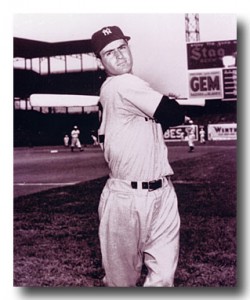Jerry Coleman: Yankee legend, World Series MVP, broadcaster, war hero, passed away Sunday at the age of 89 after over seven decades in baseball.
Coleman originally signed with the Yankees out of the San Francisco sandlots in 1942. Before he could take the field for the Pinstripes, he would spend the next three years as a marine bomber pilot in the Pacific theater of World War II, flying 57 combat missions over the Solomon Islands. After returning to the states in 1946 he worked his way back up through the Yankees’ minor league system, joining them in 1949 when he hit .275 and led all American League second basemen in fielding with .980.
In 1949, Coleman was named Sporting News AL Rookie of the Year and finished third in the Baseball Writers balloting. The biggest hit of that season came off his bat in their final game in which they completed a two game sweep of the Red Sox to win the pennant. The Yankees were clinging to a 1-0 lead in the 8th inning when Red Sox manager Joe McCarthy took out pitching ace Ellis Kinder. After Tommy Henrich made it a 2-0 game for the Yankees with a home run off Kinder’s replacement, Mel Parnell, Coleman came to the plate with the bases loaded later in the inning and hit a liner into right field that scored all three runners and won the game.
“I was almost ashamed,” Coleman said in a 2002 interview with the Daily News. “I mean, I came in afterward, and everybody was patting me on the back and congratulating me for what I felt was just a lucky hit. As long as I live my greatest thrill in baseball will always be Birdie Tebbetts popping up to Henrich at first base to end that game. We were picked everywhere from fourth to eighth that year and nobody thought we had a chance to win.”
In 1950, Coleman hit a career high .287 and set a Yankee record for double plays by a second baseman with 137. He was named to the All-Star team that year and then played a pivotal role in the Yankees’ four game sweep of the Phillies in the World Series. After losing the first two games. the Phillies took their only lead in the Series when they scored two runs in the seventh inning to go ahead 2-1 in Game 3. Coleman started the Yankees’ rally by drawing a two out walk, and in the ninth, brought in the winning run off a single. His .286 average, two runs scored and Series high three RBI earned him the Babe Ruth Award as the World Series MVP.
Coleman was poised to be another Yankee great, but the conflict in Korea and injuries shortened his 1951 campaign. He flew another 120 missions in Korea and rose to the rank of lieutenant colonel. He had a brush with death on one of his last missions when the engine on his Corsair fighter jet failed on takeoff about 100 feet from the ground. Coleman was carrying three 1,000 pound bombs, which were heavier than the plane itself, and he didn’t dare jettison them. Instead, he made a crash landing and, as the plane flipped over, the bombs broke loose and thankfully failed to detonate. Coleman, however, was pinned inside his plane, his crash helmet tilted forward with the straps around his neck, choking him. It was the quick thinking of a Navy corpsman, reaching inside the cockpit and cutting the straps that saved his life.
Coleman returned to the Yankees after being discharged from Korea in September 1953. A day for him was held at Yankee Stadium, on September 13, in which a crowd of 48,492 came out to pay tribute to him. Coleman later admitted that the second tour of duty had taken its toll and he wasn’t the same player. “My depth perception was gone,” he said. In 1955 he missed 3 and a half months of the season after breaking his collarbone on April 22, and also suffering a concussion on July 20 after being hit by a pitch. He never regained regular second base status with the Yankees, and he finished out his career as a utility infielder in 1956 and 1957. He finished his career hitting .364 in the World Series against the Brewers in 1957.
Yankee owner Dan Topping came to him after the season and offered him a job in the Yankee front office as assistant farm director. Coleman spent five years in the Yankee front office, before entering the last phase of his baseball career, broadcasting. Topping hired him to handle the play-by-play duties in the Yankee TV booth. He left the Yankees in 1969 and spent 22 seasons calling CBS Radio’s Game of the Week as well as the Padre games since 1972.
In 2005, he received the Ford C. Frick Award, for the broadcaster’s wing of the Hall of Fame. The Padres unveiled a 7 foot bronze statue in his honor outside of Petco Park on September 15, 2012. Four F-18 jets from his former Marine squadron did a flyover and Coleman said, “I start getting tears in my eyes when I start thinking about the past. I couldn’t find better a better place to spend my final days than in San Diego.”
He is survived by his wife, Maggie, and two daughters. He finished his Yankee career with a .263 batting average, 558 hits, 217 RBI, 4 World Series rings and an All Star selection. Rest In Peace Jerry Coleman. Thank you for your service in the 2 greatest uniforms in the world.





